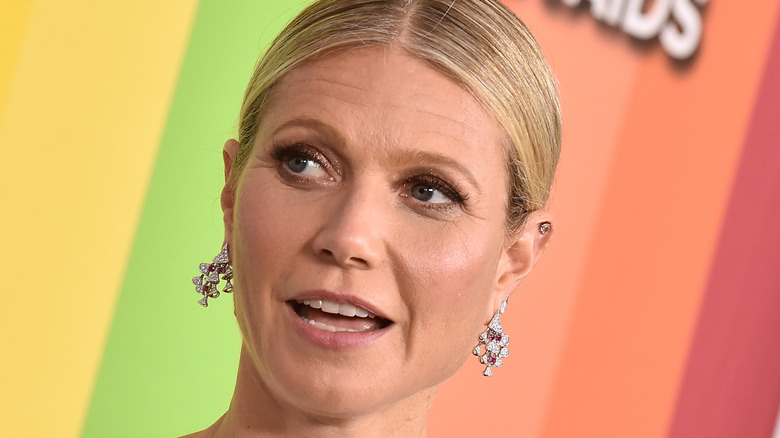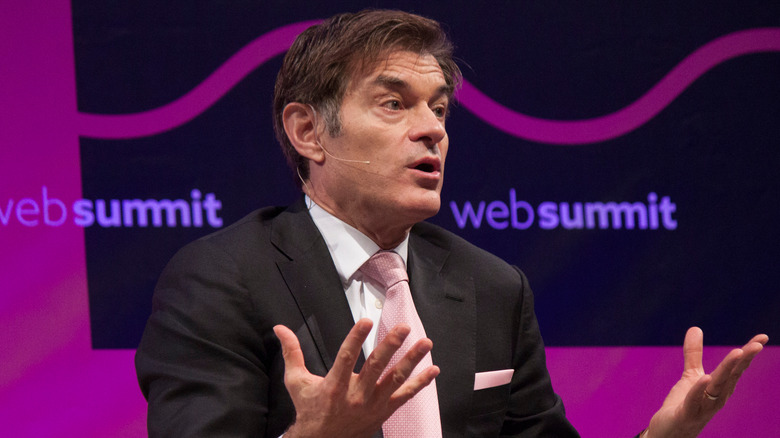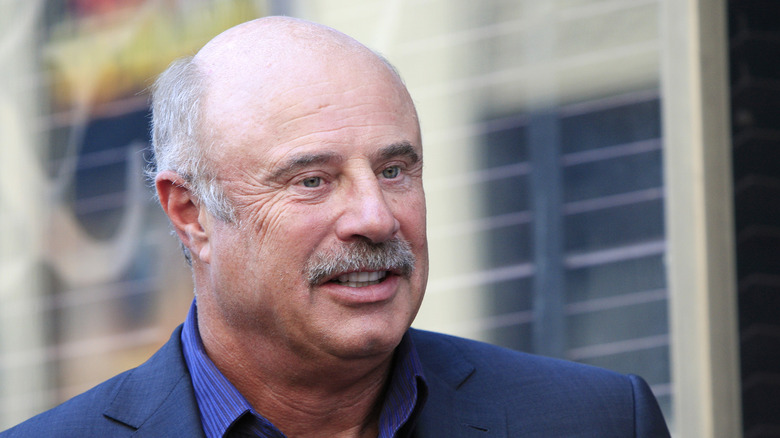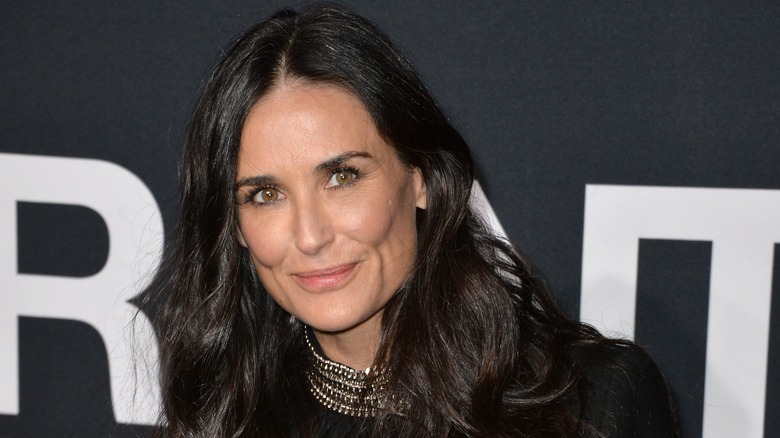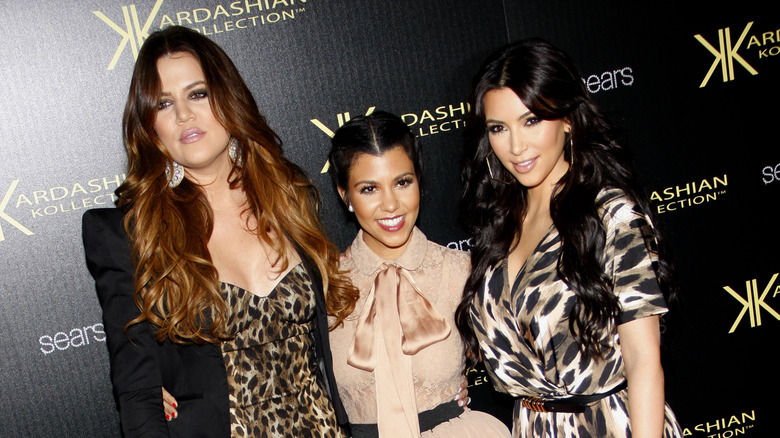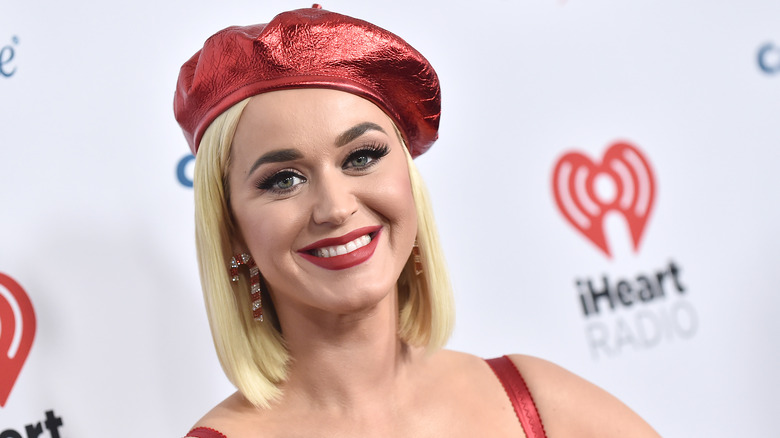Celebrities Who Gave Controversial Health Advice
It's usually hard to resist the allure of our favorite celebrities. They're always right there in front of us, unavoidably featured prominently in the public eye. They live lavish lifestyles and enjoy access to the best in all resources — the best food, the best workouts, the best cosmetics, and the best health care. In fact, they always look so good and seem so energized that it's easy to believe they know what they're doing when it comes to health, right?
Unfortunately, that's not always the case. While celebrities might talk openly about self-care and what helps them feel their best, that doesn't mean they know what's best for all of us. Occasionally, their health advice could be simply misguided, unnecessary, or a big waste of time and money. At its worst, their health advice could be downright dangerous.
Here are some celebrities who used their platforms to spread questionable health advice, as well as what the experts would have us do instead.
Jenny McCarthy and Jim Carrey
Long before people started to spread misinformation about the COVID-19 vaccines, anti-vaxxers were coming up with all kinds of false stories surrounding immunization injections, emboldened and encouraged by celebrities like Jenny McCarthy and Jim Carrey. The Hollywood couple led what they dubbed the "Green Our Vaccines" rally in 2009 to push the idea that vaccines cause autism.
They weren't entirely against the idea of vaccines, per se, or so they explained. They just thought that kids get too many vaccines and that vaccines contain "toxic" ingredients. But despite what McCarthy and Carrey would tell you, health experts like those at the Centers for Disease Control and Prevention make it quite clear: According to numerous studies on the subject, vaccines are not associated with autism spectrum disorder. The big danger behind McCarthy and Carrey's debunked notion is that parents may be scared to vaccinate their kids, ultimately putting youth in danger of contracting diseases like measles or mumps.
Megan Fox
Megan Fox was Hollywood's it girl for several years in the mid aughts, when the star of "Transformers" and "Teenage Mutant Ninja Turtles" was generating no lack of attention to her slim physique. What did Fox claim to be her secret to staying in shape? She said she liked to drink a concoction of apple cider vinegar and water as a way of cleansing her digestive tract and burning fat (via Daily Mail).
Fox wasn't the first to tout this idea, and it's easy to see why the idea would be popular. Achieving fat loss by simply drinking something every day (even something as unpalatable as vinegar) doesn't sound too bad. But Women's Health dispelled this idea by pointing out that any research linking apple cider vinegar to fat loss is inconclusive at best. Instead, apple cider vinegar might make you feel more full between meals or it might improve your body's insulin resistance (again, more research is needed) but it's not going to burn fat off your body.
However, apple cider vinegar isn't typically harmful to consume and it's full of antioxidants — plus its sharp flavor makes a great dressing for a healthy salad! So this isn't exactly the worst health advice you could get from a celebrity. Just don't take it too, too seriously.
Tom Cruise
It's usually bad form to offer unsolicited health advice to anyone, but it's especially bad when that health advice is wrong. Such is the case when Tom Cruise used his celebrity platform to publicly denounce Brooke Shields for taking antidepressants. Access Hollywood revealed that Shields was taking medication to treat her postpartum depression, but Cruise said she would have been better off relying on vitamins and exercise. He even went so far as to say antidepressants ruined Shields' career and suggested they ultimately made her unhappy.
But doctors disagree with Cruise. The Mayo Clinic recommends antidepressants as a treatment option for postpartum depression, noting that women should talk to their doctors about their specific circumstances and what risks those medications might pose. The Anxiety and Depression Association of America also lists medication as a good treatment option for postpartum depression.
It's worth noting that these unfounded claims from Cruise may have gotten him fired. Paramount Pictures, which had served as the home of Cruise's C/W Productions for 14 years, parted ways with the actor not long after (via ABC News). As recently as 2020, Entertainment Weekly reported that Cruise made a public apology to Shields, but he did not issue a retraction of what he'd said about medication.
Beyoncé
When Beyoncé took to the big screen in the 2006 film "Dreamgirls," she did so at 20 pounds below her usual weight to capture the look of her character, Deena Jones, based on renowned Motown singer Diana Ross. To lose weight quickly for shooting, Beyoncé undertook a liquid diet known as the Master Cleanse — a concoction of lemon juice, water, maple syrup, and cayenne pepper intended to help dieters lose a significant amount of weight in a short amount of time. USA Today explains that some people follow these types of diets for as long as 10 days with the aim of removing toxins from the body.
The diet might have worked for Sasha Fierce, but it's important to note that this was not a long-term plan for the singer — and the results a person gets from the Master Cleanse might vary. As WebMD explained, trendy fad diets that restrict calories to an extreme degree might result in short-term weight loss, but that doesn't mean you're losing fat. You're mostly losing water weight as well as a little bit of muscle. As soon as a person goes back to eating normally, they'll gain the weight back quickly.
Furthermore, your liver does a sufficient job of removing toxins from your body without the aid of glorified lemonade. Instead of doing the Master Cleanse, it's smarter to adopt a nutritious eating pattern you can sustain for a lifetime.
Dr. Oz
Dr. Mehmet Oz was introduced to the world by Oprah Winfrey and quickly established himself as a household name by dispensing health advice on "The Dr. Oz Show." Much of what he shared with audiences centered on complementary and alternative treatment methods to more traditional medicine. One of his more infamous claims was that a pill made from green coffee extract could serve as a miracle weight-loss cure (via NBC News).
But with Dr. Oz's fame came plenty of controversies, and rightfully so! A 2014 study published in the British Medical Journal took a look at 40 random episodes of Dr. Oz's television programs and found that about half the advice the doctor gave was scientifically unsubstantiated. His claims about weight-loss supplements even got him summoned by a Senate subcommittee, which questioned him on why he was using his platform to promote misinformation (per NBC News).
Dr. Oz's scandals continued into 2015, when doctors from across the United States sent a letter to Columbia University, where the celebrity doctor is employed, deploring what they described as "quack treatments" and calling for him to be fired. However, the university's spokesman defended "faculty members' freedom of expression for statements they make in public discussion" (via Time).
Dr. Phil
Dr. Mehmet Oz wasn't the only pseudo-doctor unleashed on the world by Oprah. The talk show host also gave a platform to Phil McGraw, better known to the world as Dr. Phil. Dr. Phil is not a medical doctor, though. As The New York Times explained back in 2008, he "is not a licensed therapist. He holds a Ph.D. in clinical psychology from North Texas State University and was licensed for 20 years in Texas, according to a spokeswoman at CBS, which airs his show. But he is no longer licensed in Texas, nor in California, where he now lives."
So when he visited Britney Spears in the hospital in 2008, then discussed her mental state with the media immediately afterward, he technically wasn't violating patient confidentiality. What he was doing, however, was misleading the public as to his qualifications to dispense clinical psychological advice.
In some cases, this pseudo-psychology poses a lot of harm. Psychology Today highlighted a specific example in which McGraw told a mother she could avoid raising a gay son by discouraging his interests in traditionally feminine activities like playing with Barbie dolls. But McGraw's advice serves only to harm a child's mental health, furthering more anxiety and depression. Instead, Psychology Today emphasizes giving children the freedom to be themselves regardless of whether their preferred clothing and toys are intended for boys or girls.
Tom Brady
If someone's a professional athlete, you'd assume they're pretty healthy. But even those in tip-top competing condition, like Tom Brady, aren't always doing everything according to what doctors would tell them to do. When Brady published his book "The TB12 Method: How to Achieve a Lifetime of Sustained Peak Performance," it attracted plenty of criticism from nutritionists who emphasized that his practices go against conventional guidance.
Brady encourages drinking a lot of water — at least half a person's body weight in ounces — while supplementing it with an electrolyte drink (via Five Thirty Eight). Now, while keeping yourself properly hydrated is sound health advise, going overboard can have possibly lethal consequences: water intoxication (or hyponatremia), a state in which your blood becomes "dangerously diluted" when you drink more than your body can handle. Brady also severely restricts his diet, avoiding acidic fruits and vegetables that he says lead to inflammation, even though he has no evidence to support this dietary guidance.
What's the end game with all this misguided info? Five Thirty Eight explained that most of Brady's health recommendations are thinly disguised endorsements — every tip is associated with some sort of product for sale on the market. Suspicious much? Nutrition advice isn't something that should be bought and sold by for-profit corporations, and dietitians are far better sources of information than celebrity athletes with book deals.
Demi Moore
Actress Demi Moore isn't the first person to use leeches in the hopes of drawing toxins out the body ... it's just that most of the people who did this were living in the Middle Ages. No, this isn't a joke: Demi Moore, in the 21st century, said she puts leeches on her bare skin and lets them suck her blood to detoxify her (via Today). "These aren't just swamp leeches, these are highly trained medical leeches. These are not just some low level scavengers; we're talking high level blood suckers," she told talk show host David Letterman during an appearance on his show.
Although leeches can and do have a place in modern medicine, you don't need them to optimize your health, as Moore believes. On the contrary, a 2014 study published in Surgical Infections emphasized that leech therapy can be dangerous as it can lead to infections.
Gwyneth Paltrow
Gwyneth Paltrow, actress and founder of wellness brand Goop, has come under criticism from many doctors for the misguided, sometimes dangerous, concepts she promotes, many of which go against science and traditional medical advice. Case in point: She's been quoted as saying sun exposure isn't harmful and therefore people should not have to avoid tanning (Us Weekly). Leading doctors, such as those at the Cleveland Clinic, state that excessive sun exposure, especially when unprotected by sunscreen, is a leading cause of skin cancer.
Another practice Paltrow has promoted is steam douching to clean the vagina. While this practice has historically been observed in certain cultures, that doesn't necessarily make it safe or healthy. In fact, it goes against medical guidance because the excess heat and moisture from the steam can breed bacteria, ultimately leading to irritation and infection! The vagina and other bodily orifices are sufficient at cleaning themselves naturally and don't require douching. Harvard Medical School states in no uncertain terms that the alleged benefits of vaginal steaming aren't supported by research.
The Kardashians
There are plenty of criticisms people could make about the Kardashians — it's the price that comes with living practically every moment of your life in the public eye. And the socialite sisters have come under scrutiny for many of their health and beauty practices that depict unrealistic expectations or contribute to negative body image among their fan base (everything from waist training to 24-hour fasting). But maybe the one that's most likely to make you say "ew!" is their endorsement of eating one's own placenta after giving birth.
Us Weekly reported that Kim and Kourtney approved of this practice, and according to Newsweek, Khloe planned to do it, too. The three sisters had their placentas freeze-dried and made into pills. Their reason for this odd practice? They say it will help stave off postpartum depression and, per American Pregnancy, this is why more Westerners are adopting this ancient Chinese practice.
In all fairness to the Kardashians, they aren't the only ones in the public eye who are doing it, even though there's no scientific proof to support any of the claims around it (via CBS News). In fact, there could be unhealthy pathogens created when a placenta is made into pill form, according to a 2017 study published in the American Journal of Obstetrics & Gynecology. That sounds like a good enough reason to say no!
Katy Perry
Getting your vitamins is a good thing, right? Sure — to an extent. But as with everything else, there can be too much of a good thing. When it comes to supplements, Katy Perry is likely overdoing it. She gained a lot of public attention in 2013 when she tweeted a picture of herself holding up a bag full of vitamins she claims she took all in the same day — and every day (via Glamour).
According to nutritionists interviewed by Cosmopolitan, Perry's supplement routine is extreme. Although there may be nothing dangerous about taking this many supplements, it's what nutritionist Jonny Bowden called "overkill."
That's pretty much the consensus among other experts. According to Johns Hopkins University and the Mayo Clinic, most healthy adults don't need to supplement their diet with any kind of pills. And these pills won't make you automatically healthier, either. If you're deficient, you're better off eating a balanced diet and getting those nutrients from food sources. Vitamin supplements are typically only necessary for people who have certain medical conditions or follow diets that restrict particular food groups.
Miley Cyrus
When Miley Cyrus came under scrutiny for looking too thin in 2012, she clapped back at her critics by attributing her weight loss to a gluten-free diet. As the Los Angeles Times reported, Cyrus' reasoning for giving up this protein found in wheat products was never about losing weight. Instead, Cyrus claimed to have a gluten allergy. She took it one step further by saying gluten was crap (or, to put it her way, "crapppp") and that everyone should try going gluten free for the physical and mental health benefits.
A gluten-free diet might work for Cyrus, but that doesn't mean it's the best option for everyone. Harvard Medical School points out that unless somebody has a condition like celiac disease or a diagnosed gluten intolerance, there aren't many benefits to cutting gluten out of your diet. Harvard even goes so far as to describe going gluten free as a fad diet and points out that gluten-free diets can be lacking in important vitamins and minerals. Moreover, many of the trendy gluten-free alternatives you find at the grocery store could have less fiber and more sugar than their traditional counterparts, which could actually cause a dieter to gain weight instead of losing it.
Donald Trump
When the COVID-19 pandemic was in full sway and had lasted more than a month, populations around the world were desperate for some kind of solution to this deadly disease that had changed nearly every aspect of life beginning in 2020. Then-president Donald Trump suggested people could kill the coronavirus by injecting disinfectant (via NBC News).
Needless to say, this was bad advice. Doctors and public health experts around the world rushed to emphasize that nobody should be taking this suggestion seriously, according to The Guardian. It was dangerous and potentially deadly. Even the makers of the disinfectant Lysol released a statement to NBC News that people should adhere to the safety labels on its products and never take any of its products internally.
Despite these messages, there were still parts of the population that fell victim to Trump's suggestion. NPR reported that poison control centers saw more than double their normal case load in the hours after the briefing.
Alicia Silverstone
We don't want to say that she's totally clueless, but Alicia Silverstone's advice she gives in her 2014 book "The Kind Mama: A Simple Guide to Supercharged Fertility, a Radiant Pregnancy, a Sweeter Birth, and a Healthier, More Beautiful Beginning" isn't exactly in line with what health professionals would tell you. According to HuffPost, Silverstone's guide to motherhood boasts several odd claims, including the notion that tampons cause infertility. "Unfortunately, feminine-care manufacturers aren't required to tell you what's in their products, which means that no one's talking about the potential pesticide residues from non-organic cotton and the 'fragrances' containing hormone-upsetting, fertility-knocking phthalates that are snuggling up to your hoo-ha," she wrote.
Is there any truth to Silverstone's concern? Experts at Buffalo Infertility & IVF Associates explain that the use of tampons is not known to have any effect on your chances of getting pregnant. The only real concern related to this product is that extended use of the same tampon could increase your chances of toxic shock syndrome.

